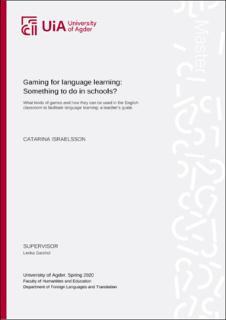| dc.contributor.author | Israelsson, Catarina | |
| dc.date.accessioned | 2020-10-06T13:04:56Z | |
| dc.date.available | 2020-10-06T13:04:56Z | |
| dc.date.issued | 2020 | |
| dc.identifier.citation | Israelsson, C. (2020). Gaming for language learning: Something to do in schools? What kinds of games and how they can be used in the English classroom to facilitate language learning: a teacher’s guide. (Master´s thesis). University of Agder, Kristiansand | en_US |
| dc.identifier.uri | https://hdl.handle.net/11250/2681389 | |
| dc.description | Master´s thesis in English (EN502) | en_US |
| dc.description.abstract | Gaming can aid in language learning, and this thesis researches the current pedagogical beliefs and attitudes towards gaming based on survey and interview answers from English teachers in Norway .A mixed-methods approach was used in order to answer the four research questions. 120 participants took part in an online survey, and three participants took part in an interview. An expert on the subject, gaming pedagogue Halvor Østerman Thengs, participated in an interview to share information and experiences regarding gaming in schools. Afterward, the data from the online survey and interviews were presented, analyzed, and discussed. The conclusion is that many teachers want to use gaming in their teaching, but they are not sure about how to do it. Practicing teachers do not receive enough information about gaming as a language learning tool. Some teachers are also skeptical about spending time on video games instead of more traditional classroom activities. The goal with my master thesis project was to create something I can use myself later on in my career, or something that can be perceived as helpful by other English teachers. Therefore, a guide on gaming for language learning was made while writing this thesis. This guide also connects gaming theory to the Subject Renewal (Fagfornyelsen 2020). It is clear from the conclusion that information about gaming needs to be distributed to teachers and schools in Norway, and the guide will hopefully reach teachers that are interested in this topic.
Keywords: gaming, digital tools, language teaching, language learning, Fagfornyelsen2020, ESL classroom | en_US |
| dc.language.iso | eng | en_US |
| dc.publisher | University of Agder | en_US |
| dc.rights | Attribution-NonCommercial-NoDerivatives 4.0 Internasjonal | * |
| dc.rights.uri | http://creativecommons.org/licenses/by-nc-nd/4.0/deed.no | * |
| dc.subject | EN502 | en_US |
| dc.title | Gaming for language learning: Something to do in schools? What kinds of games and how they can be used in the English classroom to facilitate language learning: a teacher’s guide. | en_US |
| dc.type | Master thesis | en_US |
| dc.rights.holder | © 2020 Catarina Israelsson | en_US |
| dc.subject.nsi | VDP::Humaniora: 000::Språkvitenskapelige fag: 010::Anvendt språkvitenskap: 012 | en_US |
| dc.source.pagenumber | 169 | en_US |

